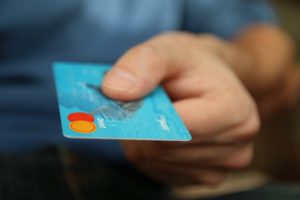12 Things to Give Up to Become Debt-Free This Year

It’s hard to get ahead in life when you’re paying 24% interest on credit card debt. Or, for that matter, 10% interest on personal loans or student loan debt.
Becoming debt-free takes you a giant leap up the ladder to wealth. In fact, paying off your unsecured debts changes the way you think about your finances—when you have debt hanging around your neck, you think defensively about eliminating debt rather than offensively about building wealth. Only after paying off high-interest debts can you truly start thinking bigger about your broader financial strategies and goals.

No one ever regrets paying off debts. Consider making a financial sprint over the next six months to become debt-free, and open up a far wider field of financial vision for building a wealthier future. It’s going to mean giving some things up, things that you’ve grown comfortable with, things that you currently take for granted.
But trust me, it’s worth it.
The Big Stuff to Give Up
The top three expenses—housing, transportation, and food—make up nearly two-thirds of the average American household’s annual budget. That means they offer the most room for savings, compared to saving a few pennies here and there by buying toilet paper in 48-roll packs rather than 24-roll packs.
That’s the good news. The bad news is that massive savings on them require massive changes on your part.
But if building wealth were easy, everyone would do it, right?
Start by brainstorming ideas for overhauling your entire annual budget from scratch, starting with your three largest expenses.
Your Housing Payment
Shockingly, millions of Americans spend over 50% of their income on rent. While mortgage lenders don’t allow homeowners to do that, many homeowners still pay around 30% of their income toward their monthly mortgage payment, which says nothing of irregular homeownership costs like repairs and maintenance.

Imagine if you waved a magic wand and made your monthly housing payment disappear. How quickly could you pay off your unsecured debts?
I don’t have a housing payment. Neither does my business partner. You can ditch your housing payment through house hacking: the art of structuring your housing so someone else pays for it.
The classic approach involves house hacking through a multifamily property, moving into one unit and renting out the other(s). Your neighbors’ rents cover all or most of the building’s costs.
But no one says you have to house hack through a multifamily. My partner has house hacked suburban homes for the last three decades through housemates, leasing storage space, bringing on foreign exchange students, and buying mixed-use buildings (her latest tactic).
I house hack through my wife’s career, as we chose an international lifestyle where her employer provides us with free housing.
Get creative with it, and find a way to have someone else pay for your housing.
Your Car
Americans just assume that every adult needs a car. It’s built into our national psyche.
Five years ago, my wife and I gave up one of our cars, and shared a single car. It helped that we moved to a home within walking distance of many amenities. But even so, my wife sometimes carpooled to work with friends, and we didn’t need a car. We just couldn’t break out of the mindset that every household needs at least one car.
A year ago, we ditched our one car when we moved to a new home where we can bike to nearly any amenity. To paraphrase Mr. Money Mustache, biking saves you money and runs on fat; driving costs you money and makes you fat.
And cars do cost you money. Far more than you think: the average car costs $9,282 per year once you add up every expense from gas, parking, maintenance, insurance, and of course the car itself.
I put that $9,282 per year toward investments, where they compound and earn me ever more passive income each year that goes by. We take Ubers when we need to go somewhere further, or rent a car for long weekend getaways. But in general, we walk or bike everywhere, and are both fitter and richer for it. The simple fact is that if you want extraordinary results such as becoming financially free by 40, you need to think differently than the Average Joe and take extraordinary actions.
What would it take for you to get rid of a car?
Meals Out & Delivery
When you pay someone else to make your food for you, you pay not just for the ingredients but also the labor expenses and the business’s profit margin. You pay far more than you would if you made it yourself.

So? During your debt payoff sprint, give up meals prepared by someone else.
That includes not just the obvious dinners out at restaurants, but also delivered food, work lunches out, take-out, and any other meal that you didn’t prepare yourself in your own kitchen.
Once again, it comes with the side benefit of making you fitter and healthier, as homemade meals inevitably feature healthier ingredients than corporate restaurants whose priorities are profits and flavor, not nutrition. Fitter and richer!
Your Saturday Mornings
The other thing you should consider giving up are your Saturday mornings or some other window of free time you can put toward a side hustle
I remember my father telling me when I was a kid: “The 40-hour workweek is the baseline to survive. If you want to succeed, you need to go above and beyond that, at least to create the initial foothold in building wealth.”
Again, you don’t need to work 60-hour weeks for the rest of your life. But the beginning of your wealth-building journey is the hardest and requires extra investment on your part. You’re on a debt-payoff sprint, after all!
No one says side hustles have to be drudgery. Do something fun or educational, and if you’re interested in building a real estate empire, check out these real estate side hustles first.
The Small Stuff to Give Up
It takes time to rebuild your life around a high savings rate, to set up your house hack, to get rid of cars. While those are where the real savings lie, that doesn’t mean you can’t or shouldn’t look for smaller, easier ways to save a little money in the meantime.
High-End Travel
Flights and hotels cost a lot of money. While I would never tell you to give up travel, find cheaper ways to do it during your six-month sprint to pay off all unsecured debts.
Start by looking into fun destinations within a four-hour drive of home. Whether that means beaches or mountains, lakes or bays or rivers, hiking or wine tasting, stay open-minded and see what you can find.
Skip the expensive hotel and consider camping or at most an affordable Airbnb stay.
If you really want to fly, research cheap flights from your home airport using tools like Skyscanner. You can also set up fare alerts on Airfare Watchdog for when fares drop below their normal rates.
Smoking
According to Smokefree.gov, the average cost of a pack of cigarettes is $6.28. That means that if you smoke a pack a day, you spend $2,292 every year on cigarettes alone.

Which says nothing of the toll on your health. It not only reduces your life expectancy (and what’s the point of building wealth if you’re not around to enjoy it?), but it also costs you money in the form of higher healthcare costs.
Once again: fitter and richer in one move!
Your Tax Refund
Your tax refund, if any, goes straight to paying off unsecured debts. No ifs, ands, or buts.
Your Human Investment Advisor
Human investment advisors cost a ton of money, usually in the 1-2% range of your assets under management—every single year. And most fail to beat the market consistently over many years.
I use a free robo-advisor (Charles Schwab’s service, but SoFi Invest is another good free one) for a diversified portfolio at my perfect asset allocation. I set it and forget it, with automated weekly contributions, automated investments, and automated rebalancing.
Stocks make up an important part of your investment portfolio, and investing in real estate alone means missing out on the many unique advantages to stocks. Even though rental properties technically beat out stocks on average over the last 150 years, stocks have performed better over the last 30 years, and allow for liquidity, diversification, and easy use in tax-sheltered retirement accounts.
New Purchases
Obviously, you need to buy some things new. Disposables like toilet paper come to mind.
But reusable items like clothes and electronics? Suspend buying them new for the duration of your debt payoff sprint. If you need a new phone or piece of clothing, buy it used.
Your Cable Subscription
There’s no reason to spend $60-120 every month for a cable TV subscription. Pick an online streaming service for $10 per month and call it a day.
Expensive Personal Products
From makeup to moisturizers, many people spend hundreds or even thousands of dollars every year on personal products.

When you’re debt-free and earning six figures in passive income from your investments, you can splurge on $40 moisturizer. While you’re still trying to pay off all your unsecured debts, you can stick with generic options.
Name Brands
The same logic applies to name-brand goods. Buy the generic version of that food at the grocery store, or that prescription medication.
In some cases, the generic and branded versions are literally the exact same product, manufactured at the same facility and labeled differently. You just pay extra for the brand marketing campaign dreamed up by some overpaid Madison Avenue ad agency.
Final Thoughts
The sooner you pay off your unsecured debts, the sooner you can turn your focus to building real wealth through assets that appreciate and pay you ongoing income. At that point, your wealth start compounding as you reinvest that income right back into more assets.
You can start building a diversified portfolio that takes on a life of its own. Beyond stocks and rental properties, you can explore lesser-known but higher-yield investments like self-storage funds (for example BiggerPockets contributor Paul Moore’s Wellings Capital), private notes and funds secured by residential properties (see BiggerPockets contributor Andrew Syrios’s Stewardship Properties), and mobile home park funds (such as Damian Bergamaschi’s Damris Capital).
Once your passive income from investments can cover your living expenses, congratulations! You’ve reached financial independence. But that journey starts by paying off your high-interest unsecured debts.
What are you currently giving up to pay off your debts? What are you considering giving up to accelerate the process?
Share in the comment section below.
By G. Brian Davis
G. Brian Davis is a landlord, personal finance expert, and financial independence/retire early (FIRE) enthusiast whose mission is to help everyday people create enough rental income to cover their living expenses. Through his company at SparkRental.com, he offers free rental tools such as a rental income calculator, free landlord software (including a free online rental application and tenant screening), and a free masterclasses on how to reach financial independence within 5 years.
Read Less

No Response to “12 Things to Give Up to Become Debt-Free This Year”